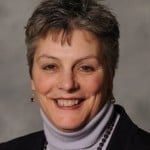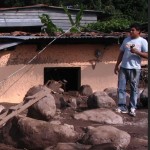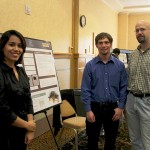To the people of Peña Blanca, Panama, Chet Hopp must seem like a godsend. He’s helping them get cleaner water, improve sanitation and understand their local volcanic hazards.
A brightly colored innovation to help families and doctors keep track of childhood vaccine records in the developing world has won the 3D Printers for Peace Contest.
Satellites orbit our lives in so many ways. They beam our favorite TV shows to our living rooms, predict tomorrow’s weather, and tell us how to get where we want to go.
 This fall semester the new class of engineering students assembled in the Rozsa Center Performance Hall to hear a speech by Dr. Kathryn I. Clark: “Pushing the Envelope: The Preparation of a Michigan Tech Engineering Degree.” Clark is a former chief scientist with NASA and she is currently president of Docere, a consulting company specializing in science and education. Among its clients are the Jean-Michel Cousteau Society, the Argos Foundation, the National Marine Sanctuaries and the Sea World Hubbs Institute. The lecture took place September 3rd at the Rozsa Center.
This fall semester the new class of engineering students assembled in the Rozsa Center Performance Hall to hear a speech by Dr. Kathryn I. Clark: “Pushing the Envelope: The Preparation of a Michigan Tech Engineering Degree.” Clark is a former chief scientist with NASA and she is currently president of Docere, a consulting company specializing in science and education. Among its clients are the Jean-Michel Cousteau Society, the Argos Foundation, the National Marine Sanctuaries and the Sea World Hubbs Institute. The lecture took place September 3rd at the Rozsa Center.
When earthquakes hit, emergency responders need to know quickly where to send their resources. A Michigan Technological University researcher and his graduate students believe they can help.
Nanosatellites are smartphone-sized spacecraft that can perform simple, yet valuable, space missions. Dozens of these little vehicles are now tirelessly orbiting the earth performing valuable functions for NASA, the Department of Defense and even private companies.
Why is a Michigan Technological University professor working to develop a model for water resources management in South Florida, 1,500 miles and several ecosystems removed from the Upper Peninsula of Michigan?
 Soil around San Vicente volcano in El Salvador has always been rich, leading farmers to plant coffee, beans and sugar cane on its slopes. In times of heavy rain, the loose soil and volcanic rock on the steep slopes washes down, covering the villages nearby in heavy mud.
Soil around San Vicente volcano in El Salvador has always been rich, leading farmers to plant coffee, beans and sugar cane on its slopes. In times of heavy rain, the loose soil and volcanic rock on the steep slopes washes down, covering the villages nearby in heavy mud.
Find out more about the work of John Gierke and Luke Bowman in the article published in Environmental Monitor
Remote Sensing and Hazard Modeling Workshop Video
Taller de Sensores Remotos y Modelacion de Amenazas en El Salvador
Michigan Technological University’s Sustainable Futures Institute (SFI) and a broad range of Pan American partners see biofuel as a good answer to society’s growing need for alternative energy. But they want to make sure that it is produced in a sustainable way, benefiting rather than harming the societies and environments producing it.
 Students in the Research Experience for Undergraduates REU summer 2013 programpresented posters on research projects they have worked on over the summer. The project topics include: measurement of diesel emission particulate matter, experimental hybrid vehicle fuel system, lithium ion battery characterization and SOC measurement, hybrid vehicle dynamometer test stand development, heavy duty truck driving simulation, and measuring temperature variations in combustion vessels.
Students in the Research Experience for Undergraduates REU summer 2013 programpresented posters on research projects they have worked on over the summer. The project topics include: measurement of diesel emission particulate matter, experimental hybrid vehicle fuel system, lithium ion battery characterization and SOC measurement, hybrid vehicle dynamometer test stand development, heavy duty truck driving simulation, and measuring temperature variations in combustion vessels.